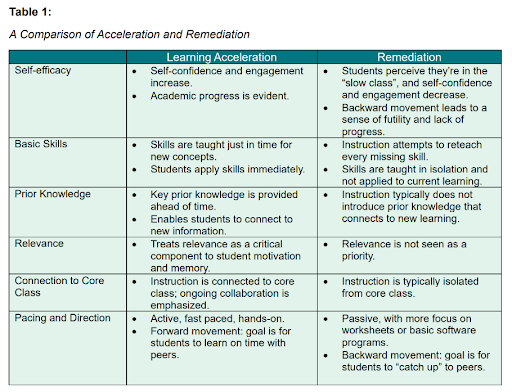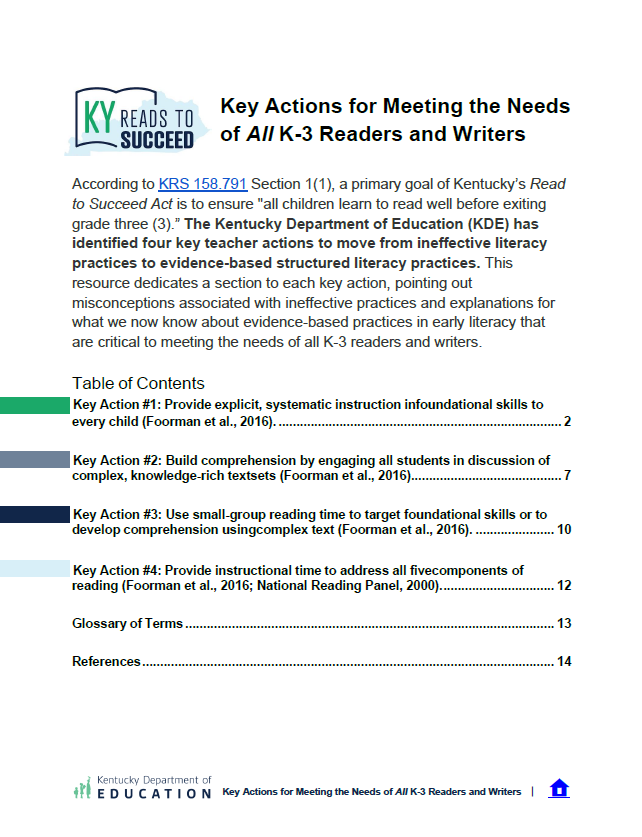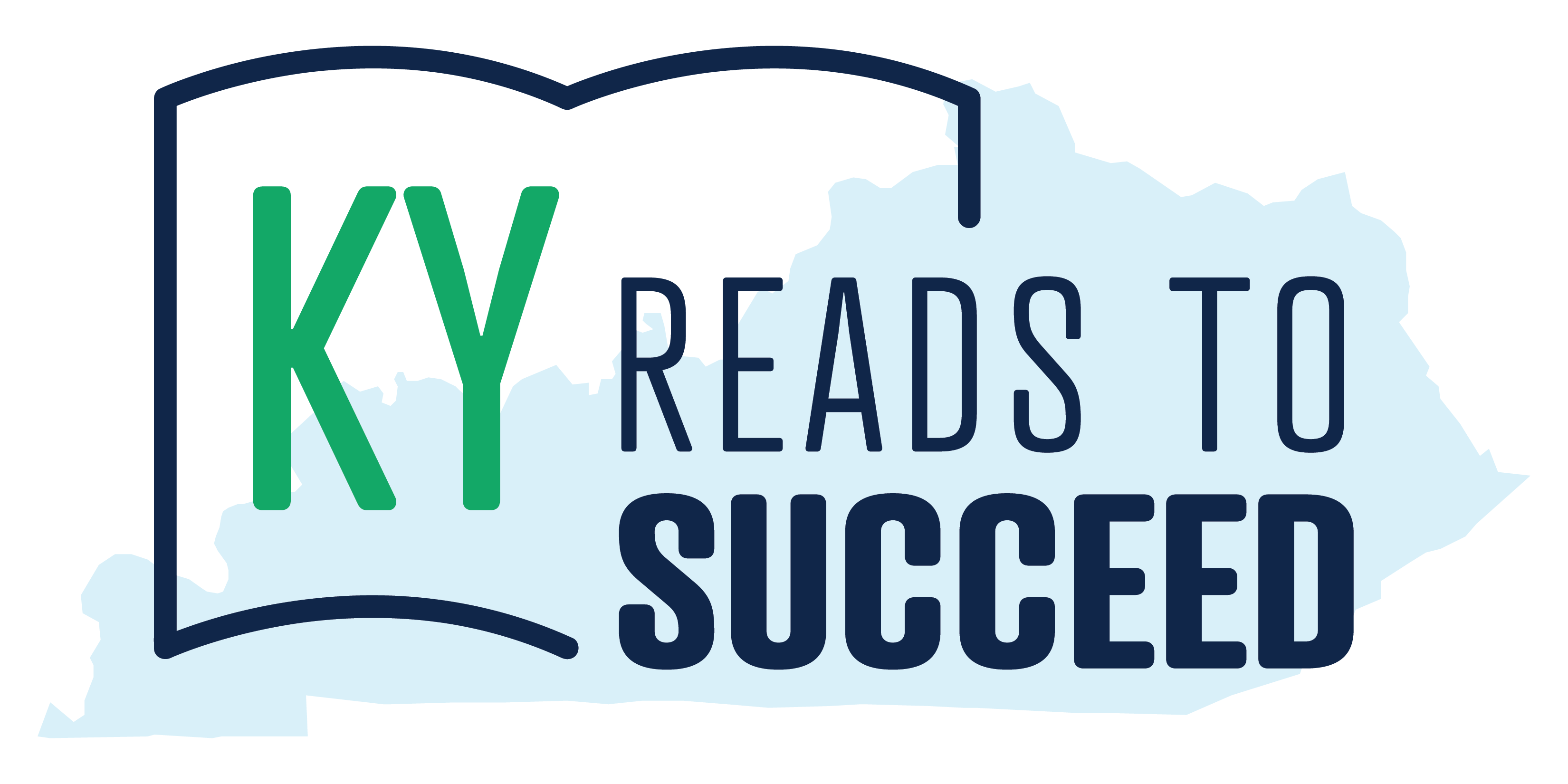Resources relating to Early Literacy include those that will assist educators in providing high-quality instruction to improve reading proficiency for all students in accordance with Senate Bill 9 (2022), the Read to Succeed Act. Documents including the Reading Improvement Plan and the Read-at-Home Plan are designed to provide information to both educators and families as they work collaboratively to increase outcomes for students. New resources will be added periodically.
NEW: White Paper: Learning Acceleration in Literacy Instruction
White Paper: Learning Acceleration in Literacy Instruction is now available to address some of the common challenges educators face when considering how to accelerate student progress toward proficiency. This white paper intends to help educators understand what is meant by learning acceleration, how it differs from remediation and how to develop an effective acceleration model.

Reading Improvement Plan
Grades K-3 Requirements:
Per the Read to Succeed Act amendments to KRS 158.305, beginning in the 2023-2024 school year, if a student’s rate of progress toward proficiency in reading needs accelerated interventions as demonstrated by the results of an approved universal screener and reading diagnostic assessment, the local school district shall provide intensive instructional services, progress monitoring measures and supports via a Reading Improvement Plan. Parents and legal guardians of students identified for accelerated interventions in reading must be provided a “Read at Home” plan.
Grade 4 Requirements:
Per the Read to Succeed Act amendments to KRS 158.305, beginning in the 2024-2025 school year, if a student does not score in the proficient performance level or higher in reading on the state annually required grade three assessment, the local school district shall provide accelerated intervention that includes evidence-based reading instruction and intensive instructional services, progress monitoring measures and supports to students in grade 4. Written notification of the interventions and supports must be provided to the parent or legal guardian of the student to include a reading improvement plan, as defined under KRS 158.305(1)(i), for students in grade 4. The Read at Home Plan Family Guide has been updated to reflect this addition and to support the families of grade 4 students receiving accelerated intervention.
Developing the Reading Improvement Plan for Students in Grades K-4:
The Reading Improvement Plan should be developed in collaboration and accordance with any existing program services plan, individualized education program, or Section 504 Plan unless the program services plan, individualized education program, or Section 504 Plan already addresses improving reading.
To assist districts in effectively developing and implementing Reading Improvement Plans, the Kentucky Department of Education (KDE) has developed a template as an example that incorporates the requirements of KRS 158.305. Districts may modify the template to fit the local context as needed. This template can be used during the problem-solving process to document intervention plans, progress monitoring data and parent notification. An existing student intervention plan developed, implemented and monitored as part of a multi-tiered system of supports may also meet the requirements of the reading improvement plan if it addresses the components required by Senate Bill 9 – The Read to Succeed Act (2022).
The Kentucky Reading Improvement Plan is now available as a form in Infinite Campus (IC). The form may be added to a student record, which allows multiple users to access the same form, allows schools to share the form with parents/guardians through the Parent Portal, and allows the form to travel with a student should they transfer within or to another district. Please see the Guidance Document for Adding a Reading Improvement Plan to a Student Record in Infinite Campus for instructions and note the name of the form has changed to "Kentucky Reading Improvement Plan" within IC. Please see the Early Literacy webpage for more information about the new version of the form.
Reading Improvement Plan Template (updated 9/14/23)
Read at Home Plan Family Guide
For more information about the Reading Improvement Plan, see the Read to Succeed KRS 158.305 Implementation Frequently Asked Questions.
NEW! Master Schedule Resource
In this presentation designed for EdCamp, Dr. Ashley Hill, Assistant Director of Early Literacy for the Office of Teaching and Learning’s Division of Early Literacy (DEL), discusses how to use intentional scheduling to improve literacy outcomes in schools.
It’s about time! Understanding the importance of the master schedule in improving literacy outcomes
Time is one of the most valuable resources in education, yet it’s often overlooked as a driver of change. In this session, Dr. Hill explores how intentional scheduling can transform literacy outcomes and create conditions for teacher and student success.
Literacy At a Glance Collection

The Literacy At a Glance Collection is a collection of resources defining some of the most critical components of literacy, instructional recommendations related to each component and an understanding of how each component aligns with the Kentucky Academic Standards for Reading and Writing. The collection currently includes six components:
Key Actions for Meeting the Needs of ALL K-3 Readers and Writers
To assist educators in moving from ineffective literacy practices to evidence-based structured literacy practices, the Kentucky Department of Education (KDE) has identified four key teacher actions. These actions are described for educators in Key Actions for Meeting the Needs of ALL K-3 Readers and Writers.

Two New Tools to Enhance Early Literacy Instructional Practices Included in the Curriculum-Based Professional Learning Guidance Document
Within the
Curriculum-Based Professional Learning Guidance document, two new essential resources are available to assist districts and schools in enhancing literacy instructional practices. The associated Learning Walk Protocol can be used in conjunction with the Instructional Practice Guides to focus conversations and feedback.
Read to Succeed KRS 158.305 Implementation Frequently Asked Questions
To assist districts and schools with the implementation of the Read to Succeed Act required in KRS 158.305, the Kentucky Department of Education’s (KDE’s) Division of Early Literacy has taken the most common questions regarding implementing the Read to Succeed Act and created an easy-to-use
Frequently Asked Questions (FAQ) document.
KDE Approved List of K-12 HQIR for Reading and Writing & Instructional Resources Consumer Guide Available for KRS 158.305 District Implementation
Per amendments to KRS 158.305 as part of Senate Bill 156 (2023), each superintendent or public charter school board shall adopt a common comprehensive reading program that is determined by the department to be reliable, valid, and aligned to reading and writing standards required by KRS 158.6453 and outlined in administrative regulation promulgated by the Kentucky Board of Education for kindergarten through grade three (3) for all schools or a subset of schools, with consultation of all affected elementary school councils." Senate Bill 156 (2023) requires superintendents adopt this common comprehensive reading program by July 1, 2024.
To assist districts in evaluating and selecting a KDE approved K-3 common comprehensive reading program, the Kentucky Department of Education (KDE) published a list of K-12 approved Tier 1 core comprehensive high quality instructional resources (HQIRs) for reading and writing and a consumer guide specific to evaluating HQIRs for reading and writing. The guide is intended to help decision-makers in Kentucky districts select high-quality reading and writing instructional resources aligned to the Kentucky Academic Standards (KAS) for Reading and Writing and their local priorities in order to meet the unique needs of students, educators and local communities.
The KDE further recommends districts consider both an explicit, systematic, cumulative, multisensory reading foundational skills supplemental resource as well as a rich, knowledge-building curriculum, such as Core Knowledge/Amplify, EL Education and Wit and Wisdom.
Read At Home Plan Family Guide
Per Read to Succeed Act amendments to KRS 158.305, beginning in the 2023-2024 school year, if a student’s rate of progress toward proficiency in reading needs accelerated interventions as demonstrated by the results of an approved universal screener and reading diagnostic assessment, the local school district shall provide families of identified students with a Read At Home Plan.
The
Read At Home Plan Family Guide includes learning experiences families can have with children at home to support their reading skills development. Additionally, the guide includes information about Senate Bill 9 (2022), Reading Improvement Plans and the key role families play in student success. A glossary of literacy terms and general tips for reading at home also are included. The at-home learning experiences contained in this document are organized into the five essential components of reading (phonemic awareness, phonics, fluency, vocabulary and comprehension).
A
Spanish version, a
Nepali version, a
Swahili Version, a
Kinyarwanda version, and
an Arabic version (the top five second languages spoken in Kentucky) are also available.
KDE is happy to partner with district and school administrators and teachers to offer support through the “Read at Home Plan Family Guide” to help districts effectively implement Read At Home Plans.
Read at Home Plan for Administrators
Per Senate Bill 9, the Read to Succeed Act, beginning in the 2023-2024 school year, if a student’s rate of progress toward proficiency in reading needs accelerated interventions as demonstrated by the results of an approved universal screener and reading diagnostic assessment, the local school district shall provide the families of such identified kindergarten through grade three students with a “Read at Home” plan (KRS 158.305). To help districts effectively implement “Read At Home” plans in collaboration with families, the KDE has partnered with the KY Collaborative for Families and Schools to develop guidance for ensuring high-impact, research-based family engagement best practices for relationship building and two-way communications.
Read at Home Plan Guidance Document
Questions?
Please reach out to Christie Biggerstaff, Director of Early Literacy, at
christie.biggerstaff@education.ky.gov with any questions.
